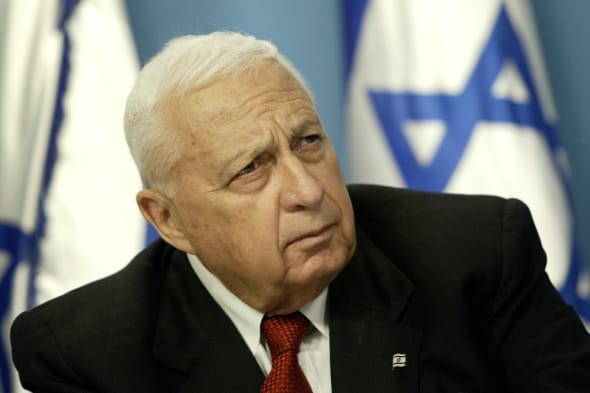 JERUSALEM (AP) -- It was vintage Ariel Sharon: His hefty body bobbing behind a wall of security men, the ex-general led a march onto a Jerusalem holy site, staking a bold claim to a shrine that has been in contention from the dawn of the Arab-Israeli conflict.
JERUSALEM (AP) -- It was vintage Ariel Sharon: His hefty body bobbing behind a wall of security men, the ex-general led a march onto a Jerusalem holy site, staking a bold claim to a shrine that has been in contention from the dawn of the Arab-Israeli conflict.What followed was a Palestinian uprising that put Mideast peace efforts into deep-freeze.
Five years later, Sharon was again barreling headlong into controversy, bulldozing ahead with his plan to pull Israel out of the Gaza Strip and uproot all 8,500 Jewish settlers living there without regard to threats to his life from Jewish extremists.
His allies said the move was a revolutionary step in peacemaking; his detractors said it was a tactical sacrifice to strengthen Israel's hold on much of the West Bank.
Either way, the withdrawal and the barrier he was building between Israel and the West Bank permanently changed the face of the conflict and marked the final legacy of a man who shaped Israel as much as any other leader. He was a farmer-turned-soldier, a soldier-turned-politician, a politician-turned-statesman - a hard-charging Israeli who built Jewish settlements on war-won land, but didn't shy away from destroying them when he deemed them no longer useful.
Sharon died Saturday, eight years after a debilitating stroke put him into a coma. He was 85.
Sharon was "a brave soldier and a daring leader who loved his nation and his nation loved him," President Shimon Peres, a longtime friend and rival, said in a eulogy. "He was one of Israel's great protectors and most important architects, who knew no fear and certainly never feared vision."
The man Israel knew simply by his nickname "Arik" fought in most of Israel's wars, gained a reputation as an adroit soldier and was the godfather of Israel's massive settlement campaign in the West Bank and Gaza Strip. More than any other event, perhaps, the public perception of the man was shaped by the massacres of Palestinians in the Lebanese refugee camps of Sabra and Chatilla by Christian militiamen allied with Israel during the 1982 invasion that was largely his brainchild.
He detested Yasser Arafat, his lifelong adversary, as an "obstacle to peace" and was in turn detested in the Arab world. Israelis called him a war hero. His enemies called him a war criminal.
He was born to Russian immigrant parents on Feb. 26, 1928, in the farming community of Kfar Malal 10 miles (15 kilometers) north of Tel Aviv, and at 14 joined the Haganah, the pre-state defense force. He commanded an infantry platoon during the 1948 Mideast war over Israel's creation.
From early on, he had a reputation for breaking rules and defying odds.
Leading a ragtag band of soldiers, some of them Holocaust survivors just off the boat, Sharon stormed the Jordanian Arab Legion stronghold at Latroun, a key spot on the road to Jerusalem, during the 1948 war that followed Israel's creation. He was badly wounded in the leg and bled for hours, surrounded by enemy soldiers. He once told The New York Times how he dragged himself into a ravine and drank mud mixed with blood.
"I know it's a terrible thing. Because people will read it and they will say, `Look, he drinks also blood,'" he told The Times, laughing his trademark deep, hearty chuckle.
Sharon received praise for his command of an armored division during the 1967 Mideast War, in which Israel captured the West Bank, Gaza Strip and Sinai Peninsula.
His finest hour in uniform, as he described it, came in the 1973 Mideast war. Yanked out of retirement by an army desperate for leadership, he commanded 27,000 Israelis in a daring drive across Egypt's Suez Canal that helped turn the tide of the war. A picture of a boyish-faced, 45-year-old Sharon, bloody bandage wrapped around his head, remains one of the most enduring images of the war.
He also played a leading role in the absorption of hundreds of thousands of immigrants from the former Soviet Union.
Credit to Aol
No comments:
Post a Comment